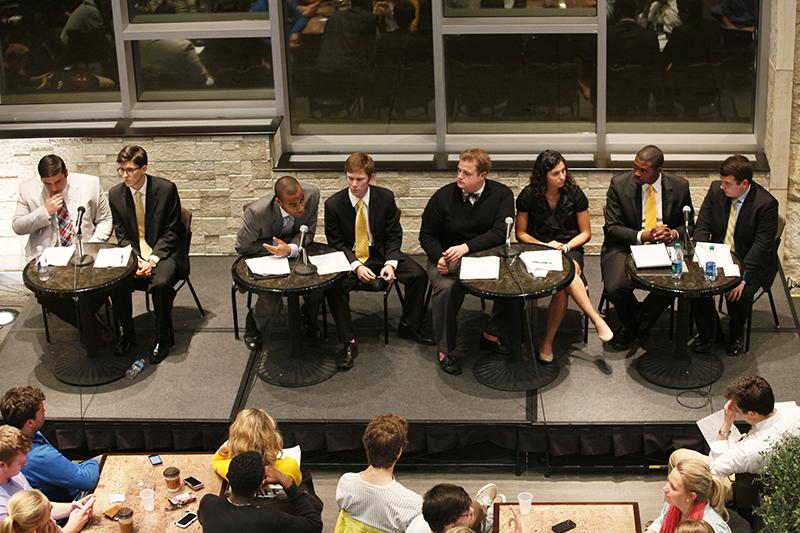The Missouri Students Association’s Board of Elections Commissioners hosted the first of two MSA presidential debates Tuesday night, giving the four slates an opportunity to describe their platforms and showcase their differences.
Hosted at The Shack, the four slates — consisting of Luke Blackburn and Connor Hickox, Taylor Major and Dan Paterson, Mason Schara and Kelsey Haberberger, and Zac Sweets and Zack Folk — were asked a number of questions regarding their plans should they win the election.
Cathy Scroggs, vice chancellor of student affairs, MSA President Nick Droege, BEC Commissioner David Wettroth and Residence Halls Association President Jackson Farley moderated.
Here is a rundown of the topics that were discussed and some notable statements made by the candidates:
####Hypothetically speaking, how would you deal with a 10 percent budget cut?
There was a general consensus in answering this question, with slight variations: Sweets-Folk said reaching out to other organizations is essential and highlighted the forced efficiency a budget cut would create. Schara-Haberberger emphasized the importance of having honest conversations with MSA auxiliaries. Major-Paterson discussed their plans for generating revenue through the Craft Studio and an endowment program, and Blackburn-Hickox said working with the auxiliaries throughout the process is very important.
####How would you go about advocating for students on the state level?
This question brought a diversity of answers, with some similarities: Schara-Haberberger and Sweets-Folk agreed that the current administration has set the precedent for more state-level involvement and that they will continue this trend; Major-Paterson highlighted their ambitions to propose legislation and get a student with voting rights on the Board of Curators; and Blackburn-Hickox mentioned their abundance of experience in the field that will enable them to successfully advocate for students.
####How will you better communicate with other organizations like RHA?
A number of solutions were provided for this problem. The Blackburn-Hickox slate advocated the importance of better communication and working with Residential Life; Schara-Haberberger discussed RHA’s involvement in “A Picnic with the Presidents” event; the Major-Paterson slate voiced dissatisfaction with RHA’s own performance; and the Sweets-Folk slate called for more than presidential communication but full collaboration between the organizations.
####How will you choose your executive cabinet?
There was unanimous agreement on this topic, with each slate looking for cabinet members who are diverse and passionate about successfully executing the tasks of their executive roles.
####What are MSA’s current strengths and weaknesses?
One notable agreement is on MSA’s current weaknesses: Not many students know about MSA, or the services it provides.
The slates had fewer agreements in regard to its strengths: Sweets-Folk believe that MSA is very strong internally, and that it is constantly growing and becoming more effective; Schara-Haberberger said it is a place of enormous potential; Major-Paterson praised it for its professional staff and institutional memory; and Blackburn-Hickox believed MSA’s strengths are embodied in the diverse resources it offers to students.
_For extensive coverage of the first MSA presidential debate, [visit the live blog](https://www.themaneater.com/blogs/becs-msa-presidential-debate-2013-oct–2013-oct-29/)._








